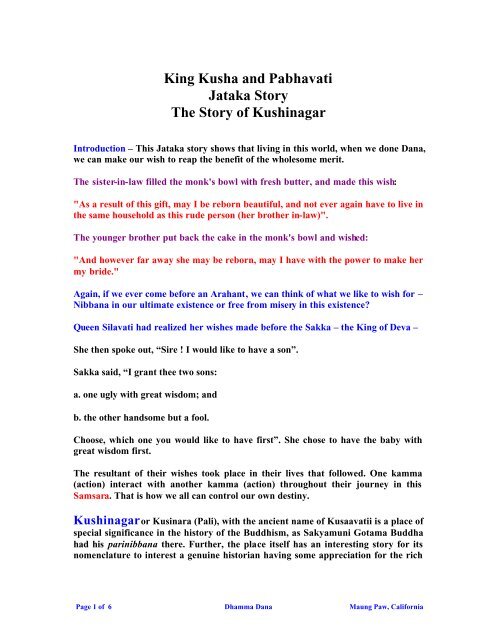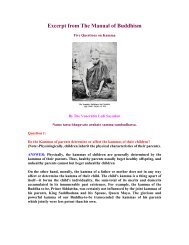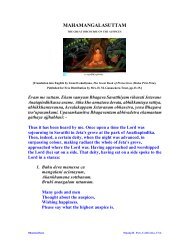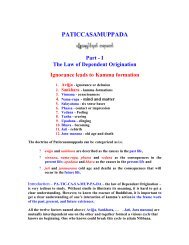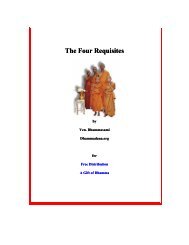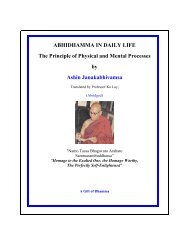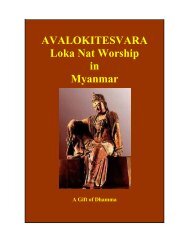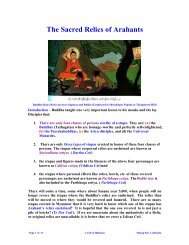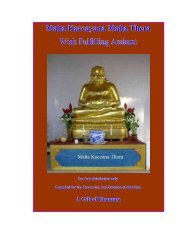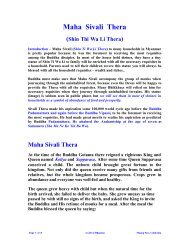Kusa and Papavati Final.pdf - Usamyanmar.net
Kusa and Papavati Final.pdf - Usamyanmar.net
Kusa and Papavati Final.pdf - Usamyanmar.net
Create successful ePaper yourself
Turn your PDF publications into a flip-book with our unique Google optimized e-Paper software.
King Kusha <strong>and</strong> Pabhavati<br />
Jataka Story<br />
The Story of Kushinagar<br />
Introduction – This Jataka story shows that living in this world, when we done Dana,<br />
we can make our wish to reap the benefit of the wholesome merit.<br />
The sister-in-law filled the monk's bowl with fresh butter, <strong>and</strong> made this wish:<br />
"As a result of this gift, may I be reborn beautiful, <strong>and</strong> not ever again have to live in<br />
the same household as this rude person (her brother in-law)".<br />
The younger brother put back the cake in the monk's bowl <strong>and</strong> wished:<br />
"And however far away she may be reborn, may I have with the power to make her<br />
my bride."<br />
Again, if we ever come before an Arahant, we can think of what we like to wish for –<br />
Nibbana in our ultimate existence or free from misery in this existence?<br />
Queen Silavati had realized her wishes made before the Sakka – the King of Deva –<br />
She then spoke out, “Sire ! I would like to have a son”.<br />
Sakka said, “I grant thee two sons:<br />
a. one ugly with great wisdom; <strong>and</strong><br />
b. the other h<strong>and</strong>some but a fool.<br />
Choose, which one you would like to have first”. She chose to have the baby with<br />
great wisdom first.<br />
The resultant of their wishes took place in their lives that followed. One kamma<br />
(action) interact with another kamma (action) throughout their journey in this<br />
Samsara. That is how we all can control our own destiny.<br />
Kushinagar or Kusinara (Pali), with the ancient name of <strong>Kusa</strong>avatii is a place of<br />
special significance in the history of the Buddhism, as Sakyamuni Gotama Buddha<br />
had his parinibbana there. Further, the place itself has an interesting story for its<br />
nomenclature to interest a genuine historian having some appreciation for the rich<br />
Page 1 of 6 Dhamma Dana Maung Paw, California
Pali tradition of ancient India. In fact, the nomenclature of Kusinara has its origin<br />
in the legends of king <strong>Kusa</strong> (Sanskritised: Kusha).<br />
Silavati in a mock admonition to <strong>Kusa</strong> for having hurled the elephant dung on<br />
Pabhavati’s back. Pabhavati has turned her back to <strong>Kusa</strong>. <strong>Kusa</strong>-Jataka, Bharhut<br />
Once, king Okkaka ruled the kingdom of the Mallas. He was a popular king but<br />
had no son despite the fact that he had sixteen thous<strong>and</strong> queens. When reproached<br />
several times by the citizens of his kingdom for not having an heir he sent all his<br />
queens to public, with the exception of Silavati, to bear a son for him. These queens<br />
amused the people for seven days, yet none could conceive. Again, the honorable<br />
citizens reproached him for not having an heir; <strong>and</strong> insisted that he should send<br />
Silavati, too, to participate in such festivities to bear him a son. The queen consort<br />
was a loyal <strong>and</strong> virtuous wo man. So, on the seventh day the queen was adorned with<br />
best jewels <strong>and</strong> dress <strong>and</strong> was carried from the royal palace to the streets.<br />
When the city was plunged to such festivities Sakka, the lord of the devas felt his<br />
throne being heated. Examining the cause, he noted that Silavati, who was not<br />
meant to be treated in an undignified way deserved his intervention as she was a<br />
chaste <strong>and</strong> virtuous lady. Sakka then decided to help her to protect her dignity. So,<br />
he descended to earth in the form of an old Brahmin <strong>and</strong> shoved his way to reach<br />
the front of the crowd where Silavati was st<strong>and</strong>ing to please the select citizens to<br />
bear a son for the king. Many nobles resented the Brahmin’s appearance before<br />
them. But before they could speak or act to keep him off, he lifted the queen of the<br />
peerless beauty; <strong>and</strong> flew in the air. Angry <strong>and</strong> disgusted, the queen, too, made a<br />
strong protest because in her opinion the old man was not fit to help her conceive a<br />
baby. No<strong>net</strong>heless, Sakka took her to a house, which he built by his own magical<br />
power. There, he laid her on the heap of sticks <strong>and</strong> stroked her gently, which made<br />
her swoon instantly. When she opened her eyes, after seven days, she found herself<br />
on a soft <strong>and</strong> elegant couch in the realm of Tavatimsa; <strong>and</strong> not on those dusty heaps<br />
of sticks. When looked around she found Sakka seated on his throne on the foot of a<br />
coral tree with all his majesty. Now, she knew the real identity of the old brahmin,<br />
who was none other than the lord of the celestial beings, Sakka. She stood up <strong>and</strong><br />
paid him obeisance. Sakka then said, “I grant thee a boon. Ask whatever you wish to<br />
have”.<br />
She then spoke out, “Sire ! I would like to have a son”.<br />
Sakka said, “I grant thee two sons:<br />
a. one ugly with great wisdom; <strong>and</strong><br />
b. the other h<strong>and</strong>some but a fool.<br />
Choose, which one you would like to have first”. She chose to have the baby with<br />
great wisdom first.<br />
Page 2 of 6 Dhamma Dana Maung Paw, California
Sakka presented her a piece of kusa grass, a heavenly robe, a s<strong>and</strong>al wood, a flower<br />
of the coral tree <strong>and</strong> a Kokanada lute. He then transported her to the king’s<br />
chamber <strong>and</strong> laid her down on the same couch where the king was lying <strong>and</strong><br />
touched her with his right thumb. She instantly knew that she had just conceived.<br />
She woke up the king <strong>and</strong> told her the whole story. First, the king disbelieved her<br />
but when he saw those heavenly presents he had to trust her. Soon a celebration for<br />
the unborn king began. After ten months of Silavati’s conception the baby was born<br />
<strong>and</strong> was called <strong>Kusa</strong>. Further, when the baby could walk <strong>and</strong> run on his own his<br />
younger brother, too, was born. The second baby was given the name Jayampati.<br />
By the age of sixteen the wise <strong>Kusa</strong> attained proficiency in all the liberal arts<br />
without any aid. The king in the meanwhile decided to enthrone him in his life-time<br />
along with his queen consort. This meant he was to get married. So, his mother<br />
Silavati sent the prince a message to choose a bride for himself. Wise <strong>Kusa</strong> was<br />
aware of his ugliness. He also knew that no woman was likely to love or live with<br />
him if she happened to see his ugliness. So, he de clined the offer. After a few months<br />
the queen again sent the same message for his marriage <strong>and</strong> again he declined.<br />
When the queen sent the same message for the third time he thought that a flat<br />
refusal would not be proper. So, he made a golden image of a gorgeous nymph <strong>and</strong><br />
told the messenger that he was ready for the marriage on the condition that they<br />
had to find the woman of such beauty.<br />
Soon the king’s messengers were sent all over the Indian sub-continent in search of a<br />
woman, who resembled the image.<br />
The Malla king of Sagal, had eight princesses. Each had the surpassing beauty<br />
comparable with the heavenly nymphs. The eldest among them was Pabhavati,<br />
whose body emanated the golden hue of the rising sun. She had a personal attendant,<br />
who was an old hunch-backed woman.<br />
One day, when the Malla soldiers were moving about the city of Sagala, they found a<br />
pond <strong>and</strong> placed the image on its bank. That day the hunch-backed also came to the<br />
pond after conveying the king’s message to Pabhatati that she had to stay in the<br />
palace. When she saw the image of Pabhavati st<strong>and</strong>ing there, she thought that the<br />
princess had not obeyed her father <strong>and</strong> had sneaked outside. So, she slapped the face<br />
of the image, which in turn got damaged.<br />
When the soldiers dem<strong>and</strong>ed an explanation for her action, she told them that the<br />
image resembled her mistress. The soldiers then quickly approached the Sagala king<br />
<strong>and</strong> apprised him of their mission. The king of Sagala was very happy to receive the<br />
proposal of <strong>Kusa</strong>’s marriage with Pabhavati. Soon, they sent messengers to the<br />
Malla king to convey the success of the mission.<br />
Before the marriage was finalized, Silavati, anticipated the most emergent problem<br />
after the marriage. She knew that no bride was likely to live with her ugly son, <strong>Kusa</strong>.<br />
So, she asked the bride not to see her husb<strong>and</strong> until she conceived to follow their<br />
Page 3 of 6 Dhamma Dana Maung Paw, California
family custom. Thus, the two were married <strong>and</strong> by <strong>and</strong> by <strong>Kusa</strong> was enthroned as<br />
the king.<br />
One day, <strong>Kusa</strong> expressed his desire to the queen mother to have a glimpse of his<br />
consort in a broad day-light. Silavati, then organized Pabhavati’s visit to the<br />
elephant stall, where the king was hiding. When the two royal ladies were walking,<br />
the king, who was then dressed like a mahout, playfully, hurled the elephant dung on<br />
Pabhavati’s back. Incensed, at the ill-behavior of the mahout, Pabhavati<br />
recommended the death-penalty on him but with the intervention of her mother-inlaw<br />
she was pacified.<br />
Dazzled by her beauty, <strong>Kusa</strong>’s desire to see her became more intense. Again, the<br />
queen mother organized a similar set up in the royal stable. Having seen the<br />
gracious look of Pabhavati, the king playfully, this time, threw the horse dung on<br />
her back. Again the queen was furious <strong>and</strong> again was she pacified by her mother-inlaw.<br />
One day, Pabhavati, too, had a strong wish to see the king in person. So, she<br />
requested the queen mother to show her a glimpse of the king. Silavati then<br />
organized a royal procession where the king was seated behind his h<strong>and</strong>some<br />
younger brother Jayampati on a majestic elephant. When Pabhavati was looking at<br />
the procession through the palace window, <strong>Kusa</strong> caught hold of her glimpse. Again,<br />
he playfully made some amorous gesticulations at her to make her fret <strong>and</strong> fume.<br />
But soon it occurred to her that the person was the king as none could act so boldly.<br />
So, to ascertain the truth, she sent the hunch backed maid to examine the matter.<br />
When <strong>Kusa</strong> saw the maid approaching close to the procession he sensed something<br />
fishy. So, he called her <strong>and</strong> ordered her not to reveal his identity to her mistress.<br />
Upon return, the maid lied to Pabhavati. Thus, Pabhavati believed that she was<br />
married to Jayampati, the h<strong>and</strong>somest among all kings; <strong>and</strong> was proud of her luck.<br />
One day, <strong>Kusa</strong> again asked his mother to show him his bride. So, the queen mother<br />
organized her visit to the royal lotus pond, where <strong>Kusa</strong> lay chin-deep behind a large<br />
lotus flower. When Pabhavati saw the laughing lotus flowers in the resplendent<br />
pond she shed all her clothes <strong>and</strong> jumped into the pond. Soon she swam to the large<br />
lotus behind which the king was hiding. As she looked irresistible with her<br />
exuberating <strong>and</strong> splashing beauty, the latter could not restrain him longer <strong>and</strong><br />
caught her by h<strong>and</strong>. He then whispered, “I am king <strong>Kusa</strong>, your husb<strong>and</strong>”. The<br />
queen thought that she was caught by a goblin <strong>and</strong> swooned. The king then let her<br />
go.<br />
Pabhavati was not a fool. When she regained consciousness <strong>and</strong> recalled the words<br />
of <strong>Kusa</strong> in the pond, she could easily correlate all the events ever since her first<br />
encounter with <strong>Kusa</strong> in the elephant stall; the stable; the royal procession; <strong>and</strong><br />
finally in the lotus pond. Now, she knew the identity of the ugly man, who she met<br />
several times, <strong>and</strong> who was none other than her husb<strong>and</strong>. She was terribly shocked.<br />
She felt beguiled <strong>and</strong> cheated. She was married to a man who looked most repulsive.<br />
Page 4 of 6 Dhamma Dana Maung Paw, California
Now, she discovered why she was forbidden to see the ugly man in the day-light. She<br />
sobbed but soon she thought that because she was young <strong>and</strong> pretty; <strong>and</strong> also a<br />
princess why not she should find a better suitor for herself. So, she soon organized a<br />
trip to her father’s kingdom <strong>and</strong> resolved never to return.<br />
But <strong>Kusa</strong> followed her <strong>and</strong> finally won her back by his wisdom <strong>and</strong> prowess.<br />
King <strong>Kusa</strong> <strong>and</strong> Princess Pabhavati<br />
Their Aspirations – Su Taung<br />
(Min Kuta <strong>and</strong> Papawati)<br />
To illustrate the working of kamma, we present the one previous life story of King<br />
<strong>Kusa</strong>, the Bodhisatta, <strong>and</strong> Princess Pabhavati (Papawati), who was in a later life to<br />
be Princess Yasodhara.<br />
In one previous lifetime, the Bodhisatta was the younger of two brothers, <strong>and</strong> lived<br />
with his elder brother. One day, he returned home late to find a cake meant for him<br />
had just been put into the bowl of a Pacceka-Buddha (solitary Buddha) by his sisterin-law.<br />
He therefore spoke angrily to her, <strong>and</strong> snatched back his cake from the monk's bowl.<br />
Thereupon, his sister-in-law filled the monk's bowl with fresh butter, <strong>and</strong> made this<br />
wish:<br />
"As a result of this gift, may I be reborn beautiful, <strong>and</strong> not ever again have to live in<br />
the same household as this rude person (her brother in-law)".<br />
Not to be outdone, the younger brother put back the cake in the monk's bowl <strong>and</strong><br />
wished: "And however far away she may be reborn, may I have with the power to<br />
make her my bride."<br />
The sister-in-law was reborn as Princess Pabhavati, the eldest <strong>and</strong> most beautiful<br />
daughter of a king. The younger brother was reborn as King <strong>Kusa</strong>.<br />
King <strong>Kusa</strong> - Resultant Kamma action –<br />
For first angrily snatching back the cake from the monk's bowl, he was born ugly,<br />
but as a result of giving back his cake, his wishes bore fruit, for he was exceedingly<br />
wise.<br />
Princess Pabhavati Resultant Kamma action –<br />
Page 5 of 6 Dhamma Dana Maung Paw, California
Princess Pabhavati was betrothed to King <strong>Kusa</strong> by her parents, but upon<br />
discovering later how ugly he was, she ran away back to her parents' palace. King<br />
<strong>Kusa</strong> followed, <strong>and</strong> for many months undertook all kinds of menial work to be near<br />
Princess Pabhavati, unrecognized by all except Princess Pabhavati . She however<br />
spurned his love, saying: "As well to catch the wind within a <strong>net</strong>, as woo unwilling<br />
maid."<br />
Eventually, her father angered at her refusal to accept King <strong>Kusa</strong>, <strong>and</strong> her father's<br />
palace surrounded by enemies, she had no choice but to turn to King <strong>Kusa</strong> for help.<br />
There upon, King <strong>Kusa</strong> over came all their enemies <strong>and</strong> won the Princess' heart<br />
through his magnanimity, courage <strong>and</strong> skills.<br />
Page 6 of 6 Dhamma Dana Maung Paw, California


